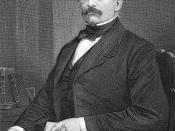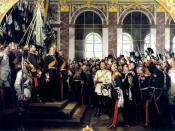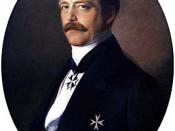"Unification of Germany by Bismarck, was not planned, it was improvised." - Discuss.
When Otto von Bismarck became Minister-President of Prussia in 1862, German nationalism was already more than 40 years old. First apparent in the opposition to Napoleon's occupation of the German states, national feeling grew into a movement after 1815. This feeling was encouraged by a growth of interest in German literature and music and by increased economic cooperation between the north German states. By 1848 it was strong enough to make the creation of a united Germany one of the main demands of the revolutionaries.
Bismarck was regarded by many of his generation, and by subsequent contemporaries of Germany, as the founder of the Second Reich. This was an impression he himself was keen to propagate in his autobiography, although this is a piece of evidence we cannot rely upon (to an extent) due to its publication in 1890, subsequently released after his resignation.
He emphasises his own role in the events of 1860, making the image of Unification planned by him. Although he was at the forefront of the 'revolution from above', any attempt of unification could have been improvised by him and yet deemed planned. Before I delve into the significance of Bismarck's role in the unification of Germany and asses the statement above, it is important to note that Bismarck was working within a political, diplomatic, social and economic situation which he did not create and over which he did not have complete mastery.
One of Bismarck's biographers Otto Pflanze claims that Bismarck was 'driven by a vital compulsion to seize the helm and steer'. Due to Bismarck's strong religious beliefs he felt that he believed that, by himself, the individual can create nothing but that it was his moral duty too try...


